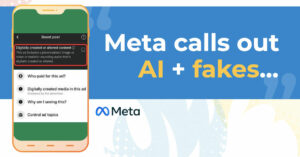Mates, Fakes + TellyTok

Here’s some industry news that caught our eye this week…
🔥IG’s new feature lets you create stories on other people’s feeds
🔥TikTok on your telly
🔥Meta is tackling photo fakery in ads

Post stories on your friends’ feed for them…
Instagram is testing a new feature that allows you to create stories for your friends. This means that instead of posting on your own story feed, it can now appear directly on your mates’ (with their permission, of course!). It could be a great way for brands to collaborate with influencers or online partners and it’ll be interesting to see if businesses will be able to take advantage of this. We’ll certainly be testing it out with some of our clients. The development looks to be part of an ongoing trend from Instagram, transitioning away from its past as a ‘look-at-me’ platform, towards a focus on building communities. We’ll be keeping our wolf ears and eyes peeled for more…
TikTok is coming to a big screen (very) near you…

A new announcement from Google reveals that users will soon be able to watch TikTok on their TV using Chromecast, streaming videos from their phones to much larger screens. Although this may seem like just a bit of fun, it does indicate that TikTok isn’t lo-fi anymore, and it’ll be interesting to see if this has an effect on the nature of content which does well on the platform. To date, successful TikTok style is still about rapid-fire authentic content. But more and more TikTok videos have a greater deal of thought, planning, money and production value behind them …making it worth watching on a bigger display, like TVs? More than ever, brands and professional content providers need a dedicated TikTok strategy to keep up with this rapidly changing, increasingly prominent platform. Luckily, we have a blossoming (and now Highly Commended) approach, which is going great guns for a client of ours, so are well set to help tentative TikTokkers. Just saying.
Meta is calling out AI fakery…

Meta is adding a checkbox, insisting users disclose whether an ad has used AI or digital trickery to create something that looks or sounds real, but may have been altered. It’s just one step towards tackling the biggest online challenge we face… telling reality from fiction. Not a new challenge online, but increasingly prevalent and getting harder than ever to tell apart. Social platforms have always rewarded real and authentic content. Perhaps any business’ response to these changes should be to double-down on the real stories and find new and creative ways to truthfully show who they are, lifting genuine content to the fore. In the main, this sounds like a good, necessary update from Meta. AI is an incredible tool for creativity – so long as creative content is clear about its use, not trying to harmfully pretend otherwise or use someone’s likeness or IP without permission. One of our latest TV ads used AI-enabled software to great effect to create extreme slow-motion, 10x the framerate we filmed to enhance the fun and emotion of the scene. It’s silly, it’s obviously enhanced, but would this new move from Meta technically mean our ad could be flagged?
Just one more complex question in the fast-moving and ever-changing AI-flavoured creative landscape we’re all navigating.

